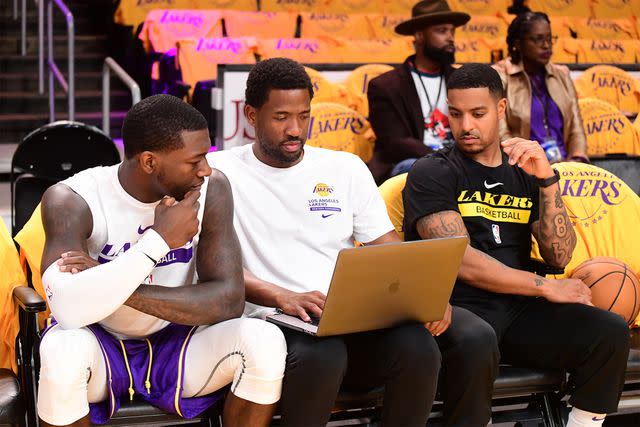Lakers Assistant Coach JD Dubois on Improving Mental Health Resources for Athletes: 'Everyone Has a Story'
"A lot of athletes battle with that internal dialogue and not really understanding what that is," Dubois tells PEOPLE

Everyone has a story.
When he was in college at Loyola Marymount University in California, Lakers assistant coach JD Dubois battled homelessness and struggled with his mental health.
During his years at the Southern California school, Dubois, 32, recalls having classmates with "parents that were able to afford $54,000 a year" and supply them with credit cards for gas and food, he tells PEOPLE.
"Then, in that same classroom, there's me. I was dealing with some homelessness, and my dad lived out of his car," Dubois shares.
But the aspiring athlete empathized with how he saw his classmates struggling too.
"My friends who had all this money, some of them it was like their dad wasn't around as much or their mom was struggling at home with feeling like she didn't have much to do because the kids are gone and they're worried about her, and that's just as valid of a struggle," says Dubois, who founded his non-profit organization Everyone Has A Story (EHAS) in 2016.

The organization was created to advance and normalize the conversation around mental wellness in young Black communities one story at a time through service, outreach, and education.
Related:Tyrell Terry Retires from NBA at 22, Says Anxiety from the Sport Led to 'Darkest Times' in His Life
Dubois says he hopes his work will reassure athletes that any and all mental health struggles they're facing are important.
"That's something that just really described what I wanted, anyone who engaged with our organization to feel that your story, perspective and path is validated within this community of organizations."
Never miss a story — sign up for PEOPLE's free daily newsletter to stay up-to-date on the best of what PEOPLE has to offer, from juicy celebrity news to compelling human interest stories.
And within the NBA, Dubois commends league commissioner Adam Silver for implementing a mandate that requires each team to provide players with access to a mental health professional. "Adam Silver has done an unbelievable job just setting that precedent," he says.
The most common obstacle that Dubois sees plaguing athletes is performance anxiety and internal pressure, he says.
"A lot of athletes battle with that internal dialogue and not really understanding one, what that is, but two, once they understand what it is, how do I build a better relationship with my inner voice? And those are probably two of the main areas that I see players dealing with on a day-to-day," he says.
Related:Kevin Love Donates $500K to Mental Health Research After Receiving Arthur Ashe Courage Award
One area he sees room for improvement in is "the gap between the clinician's education and research and the athlete who needs the support," says Dubois, who hopes he can pave the way for coaching staffs to be more aware of potential signs of mental health struggles in players, and how players can be more educated on the signs themselves.
"That's really where I want to stand in that gap and say, 'Okay, what are some things that we can be on the lookout for certain athletes?' Or 'Hey, I think this athlete is struggling with this. Do you have any language that I can help him with?' And then learning the information and then sharing it with the athletes. Sometimes they may not right away want to go sit and talk to the mental health professional, but if we collaborate it gets easier," he says.
For more People news, make sure to sign up for our newsletter!
Read the original article on People.

 Yahoo Sport
Yahoo Sport 





































